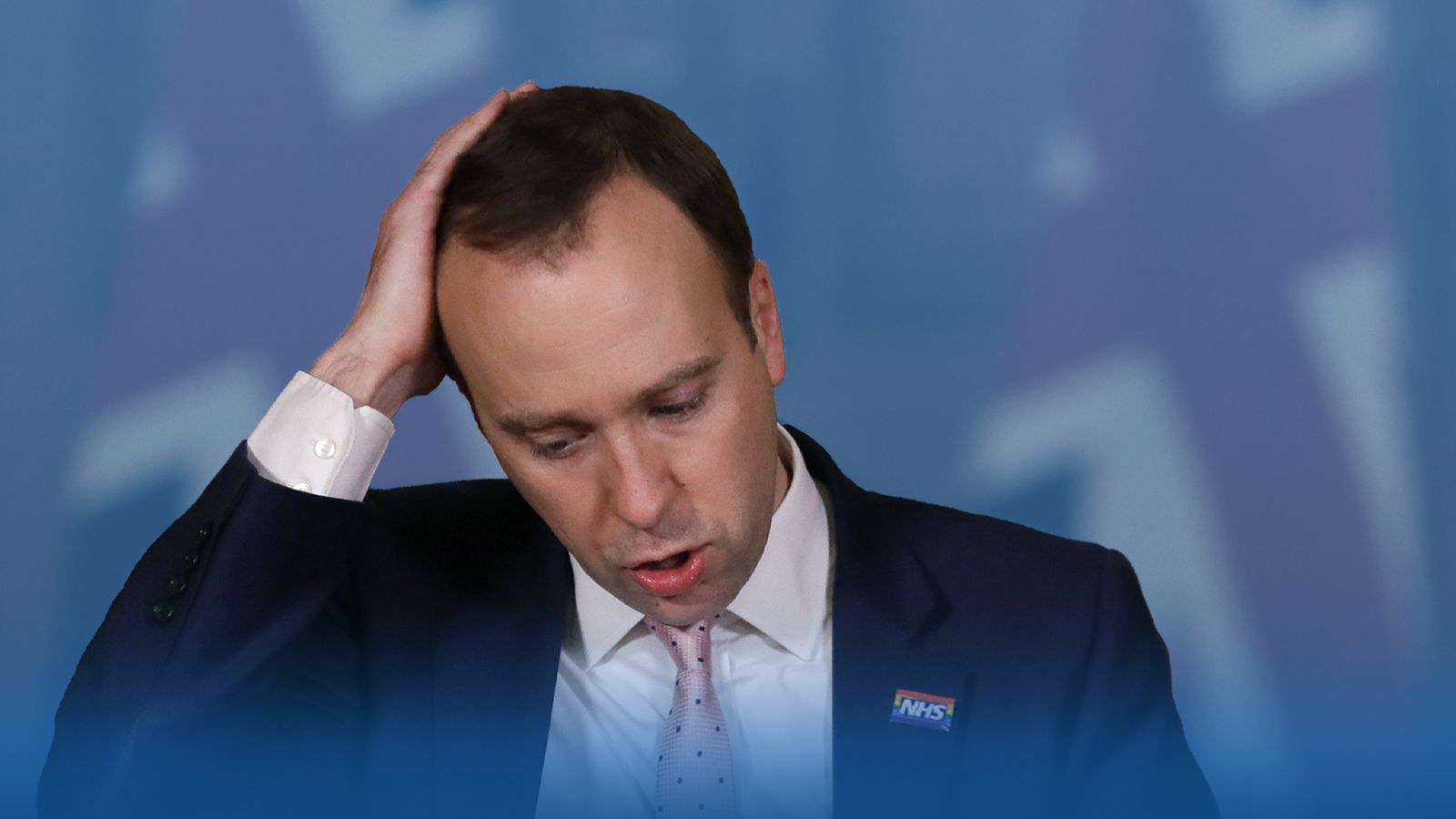For days this week, coverage of their “Lockdown Files” filled the first pages of The Daily Telegraph.
They make up a scoop on a par with the Telegraph’s earlier exposure of leaked files relating to MPs’ expenses.
Yet on this occasion, no one involved in the story emerges with their reputation enhanced by the revelation of more than 100,000 messages from Matt Hancock’s phone while he was health secretary.
Not the former health secretary and his colleagues – who are shown discussing what actions to take against COVID in their own political interests, not in the interests of the public.
Not Isabel Oakeshott – the journalist who betrayed multiple bonds of trust in handing the data to the Telegraph itself.
And not the newspaper – which is attempting to bend the inconclusive material in its files in support of an anti-lockdown agenda, openly laid out in an editorial which dismisses “lockdown absolutists” as “positively dangerous”.
The Telegraph’s revelations happened to coincide with publication of the UK edition of the Edelman PR company’s annual Trust Barometer.
This involved a relatively large representative sample – 3,051 of the population – at the end of January.
The conclusions are unsurprising, if grim.
Read more:
Who is Isabel Oakeshott?
Key exchanges in the Whatsapp leak
How were the messages leaked – and what is an NDA?
For the first time in eight years, a majority of Britons expect their standard of living to drop.
Trust in the government is at its lowest ebb (27%) since 2016.
And 77% of us think politicians are making things worse.
Speaking at Edelman’s launch, cabinet minister Penny Mordaunt blamed the loss of trust on a host of others including bankers, the BBC, the Catholic Church and the media but not the present government.
In the report, businesses and non-governmental organisations get positive ratings for ethical conduct but both the government and the media have dropped still further into the negative zone for both competence and ethics.
The only comfort for the media (-28 competent, -14 ethical) is that collectively it is doing less badly than government (-61 competent, -27 ethical).
Timing means that the Lockdown Files cannot be a contributor to this alarming decay in trust in government and the media.
Instead, they can be taken as a symptom of the problem.
Please use Chrome browser for a more accessible video player
‘We need to learn lessons’
Journalistic scrutiny of the COVID pandemic is a good thing. We need to learn lessons.
The UK has a comparatively poor record in terms of outcomes from the outbreak.
According to the independent Our World in Data resource, the UK ranks as the 22nd highest country in terms of deaths per million of population attributed to COVID.
This figure, 3,243, is below a number of smaller eastern European countries and the United States (3,348) but worse than Italy (3,186), Poland (2,982), Portugal (2,542), Spain (2,542), France (2,433), Sweden (2,242) and Germany (2,016).
Those last two countries are at opposite extremes in terms of mandatory precautions taken.
Read more:
Hancock accused of rejecting care home testing advice
‘Not personal’ – Oakeshott admits breaking NDA
Isabel Oakeshott was formerly the political editor of The Sunday Times. Her revelation of speeding points swapping between then cabinet minister Chris Huhne and his estranged wife, Vicky Price, led to the couple being sent to prison.
Oakeshott has been a ghostwriter for the conservative peer Lord Ashcroft. In her private life, she is the partner of Richard Tice, the leader of Reform UK and a Talk TV broadcaster.
Matt Hancock gave Oakeshott, his friend, access to the messages so she could help write his memoir ‘Pandemic Diaries’. She broke a Non-Disclosure Agreement (NDA) to pass on the material to the Telegraph. She also raised eyebrows in News UK, currently her main employer. Oakeshott is the international editor of Talk TV.
Please use Chrome browser for a more accessible video player
On that channel this week, Harry Cole, the political editor of The Sun, protested: “The Sun? Sunday Times? Times? Other vessels are available in this building.”
Oakeshott told the BBC “they did not pay me for the messages” but The Daily Telegraph is paying her for writing about them.
She appears to have been drawn by its overtly critical views of lockdown, the precautions taken against COVID, and because she is a “passionate Brexiteer”.
Oakeshott says she wanted the material out now because the official COVID-19 inquiry, set up by the government, could be a “colossal whitewash” and because the public “may have to wait many years before it reaches any conclusions”.
But Baroness Heather Hallett, the retired appeal court judge who is chairing the inquiry, retorted “this inquiry will not drag on for decades… that is why I sought the express permission of the then prime minister to issue interim reports”.
Oral hearings start in June.
Hancock claims there is no public interest in exposing his messages now because he has already provided them to the inquiry.
Please use Chrome browser for a more accessible video player
No ‘smoking gun’ in leaked messages
The Telegraph says it has published the files “in the interest of openness, transparency and accountability… the public has a right to know what went on behind the scenes”.
This is typical of high-flown declarations editors usually make on these occasions.
There is no doubt that putting sometimes uncomfortable information into the public domain should be applauded as a primary function of journalism.
But one may question how the paper got its scoop or the interpretation it is giving it.
And other than fuelling gossip, the messages published so far are not very interesting.
They do not contain a “smoking gun” pointing to culpable behaviour. Much of what they show was already well-known.
Hancock’s ploys to massage delivery of his 100,000 tests a day target feature in last year’s Sky drama, This England.
The high number of deaths in care homes are all the evidence needed that Hancock failed to put a “protective ring” around them, as he claimed.
Please use Chrome browser for a more accessible video player
The specific revelation that opened the Telegraph’s coverage – that Hancock had turned down advice from the chief medical officer to mandate testing of people admitted to care homes from outside NHS hospitals – is largely immaterial.
Not many admissions in that category were taking place as the lockdown came into force.
Any which did have not been identified as significant spreaders of infection.
It is already established that the UK did not have access to the full volume of testing capacity that Hancock was claiming.
‘Pungent exchange’ buried
It is equally interesting what aspects of its cache the Telegraph is choosing not to showcase.
Most of its competitors dug out this revealing exchange as the juiciest nugget in the second day’s data dump – Hancock to Education Secretary Gavin Williamson: “Cracking announcement today. What a bunch of arses the teaching unions are”. Williamson: “I know. They really really do just hate work”. Hancock: two crying with laughter emojis.
The Telegraph buries this pungent and puerile exchange.
Instead, Williamson, who was twice sacked in disgrace as a cabinet minister, has a self-serving column on the front page headlined: “Perhaps I should have quit when my plea to put pupils first was ignored.”
This accords with the paper’s editorial line and Oakeshott’s latest emotive commentary inside, which begins: “Of all the travesties and tragedies of the pandemic, the treatment of children is arguably the most egregious.”
Such calculated elision of assertion with facts should be beneath a great national news organisation and the current generation of political leaders.
It surely contributes to the decrease in trust, evident in the Edelman survey, and to the increased polarisation of society.
Many of the precautions taken in panic against the pandemic may have been ineffective but there is no evidence that they made matters worse or weren’t worth trying at a time of great uncertainty.
Inquiries should evaluate the evidence. The mainstream media should serve the public by reporting what they manage to find out dispassionately.
Even the title given to the cache by the paper is emotive.
In truth, drained of journalistic froth, these are “COVID Files” or “Hancock Files” – but “Lockdown Files” sounds more damning.
News organisations should not distort their reportage to ferment political prejudices.






















